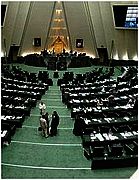Majlis is Kept in Dark of Administration’s Agreements and Decrees
» More Tension Between MPs and the President
In the past year most disputes between the Majlis and the administration were hotly debated in the parliament and the media, but eventually were resolved with the intervention of pro-administration principalist MPs (who generally support the administration and are viewed as its allies) and sometimes because of the “advice” that came in favor of the government (a reference to ayatollah Khamenei’s letters and messages), the non-notification of some important government oil agreements to the Majlis, the non-implementation of certain Majlis laws by the executive branch, and also the non referral of government bills and regulations to the Majlis for legal reviews have caused a new round of tension between the legislative and executive branches of government in the Islamic republic.
Speaking on this subject the head of Majlis’ energy committee recently said, “Despite the pursuit of the energy committee in this regard, the Majlis is still in the dark over the provisions of the gas agreement between Iran and Pakistan.”
Speaking on the floor of the Majlis, Hamid-Reza Katoozian said that he had raised this issue in the past, adding, “We believe the gas agreement between Iran and Pakistan is a government contract and therefore must come before the Majlis for review, according to article 77 of the constitution, and must be approved.”
He rejected the administration’s justification for not sending the agreement to the Majlis and objected to claims by some government officials that “many parts of the agreement were confidential.”
“According to article 77 of the constitution, we stress that all oil and gas contracts and agreements between the government and other countries must come to the Majlis for review and approval before they can be implemented,” Katoozian said.
“How is it that a foreign government, and even a secretary at the ministry of oil who types the contract is more trusted than the Majlis in this regard whose representatives are kept in the dark over the secret provisions of the arrangement,” Katoozian further said.
This is not the first and only instance when Majlis representatives have complained about the administration’s secrecy. In the last few weeks, a number of representatives have said that the government has stopped sending its decrees to the Majlis, and some have even called for some response to this. A member of Majlis’ leadership Hossein Ghafoorifard recently said, “The government has violated a principle of the constitution and the solution is for the Majlis leadership to announce that those decrees that contravene the law are not executable.” Ghafoorifard is a member of the principalist faction which has been the most supportive group of the Mahmoud Ahmadinejad.
Such criticism over the government inaction has not been confined to the Principalists. Members of the minority faction too have said that the government’s actions or inactions in this regard are illegal and unconstitutional. Majlis representative Mohammad-Reza Khabbaz recently said, “According to article 138 of the constitution any government decree - regardless of what it is called - which is passed down to the executive branch for implementation must come to the head of the legislature legal legislative review.”
Dariush Ghanbari is another MP belonging to the minority faction known as the Khate Imam (ie Followers of the Imam’s Path) who has aired his complaint. “The reason why the administration refrains from sending some decrees do the Majlis is to prevent if from stopping them if they violate the constitution. This weakens the Majlis. But Majlis’ inaction has also made the government bolder in continuing this practice. It has not embarked even on the least action which is to question the president on the subject,” Ghanbari said.
Illegal Decrees and Majlis’ Options
While complaints have been aired against the administration, the head of Majlis’ investigative arm Ahmad Tavakoli also took a tougher line against the president two week ago and said, “The president has a special interpretation of article 113 of the constitution which he says gives him the authority to not implement a law if it is not in the interest of the country as he sees it. He has openly and publicly said this, to the amazement of his listeners.” Tavakoli also said that Ahmadinejad had chosen not to attend the sessions of the State Expediency Council, contrary to the requirements of article 112 of the constitution and the orders of the leader. I this particular speech, Tavakoli went further and listed the options that the Majlis had in dealing with a president who violated the constitution. Among the legal and constitutional options he listed was the provision related to impeaching the chief executive, and even said that, “two thirds of the Majlis could vote to give the president a vote of no confidence, which would be communicated to the leader according to article 110 of the constitution.”


